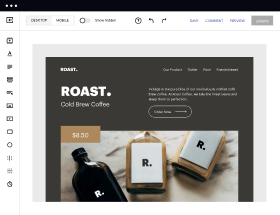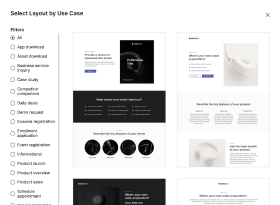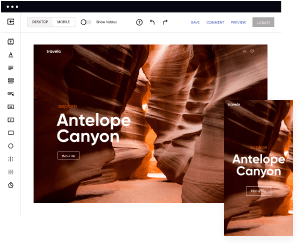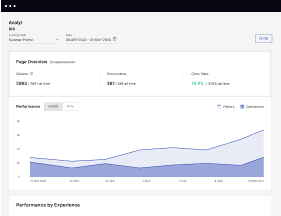Bring your ideas to life with Instapage's modern referral program page template
Unleash your creativity with the modern referral program page template. Try Instapage today.

Easy to build without coding
With the intuitive drag-and-drop builder, anyone on your team can create high-converting pages without any knowledge of code or design. Make enhancements to your landing page with custom widgets using Javascript, HTML/CSS, or third-party scripts.
Multiple layouts for any industry and goal
Select from 500+ landing page layouts built to boost conversions across industry-specific scenarios. Customize them by adjusting fonts, adding images, and generating on-brand content with the AI assistant. Quickly scale with Instablocks® and Global Blocks that you can save, reuse, and update globally.
Loads fast and looks polished on any device
Every template is responsive, which means they present professionally on any device and load blazingly fast with our Thor Render Engine. You can also power them up with Google AMP technology to deliver an unparalleled mobile experience and drive higher conversions.
Robust analytics & experimentation
Get real-time updates and reporting across all your devices, showing the number of visitors, conversions, cost-per-visitor, and cost-per-lead. Launch AI-powered experiments, run A/B tests, and use heatmaps to analyze user behavior, then optimize your landing page to maximize conversions.
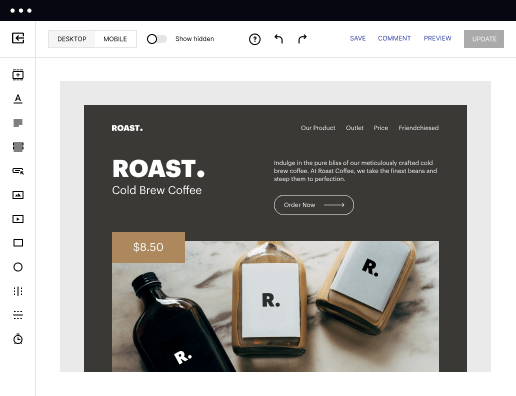
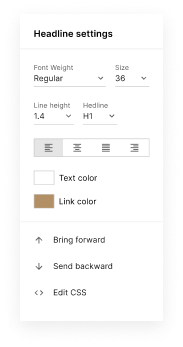
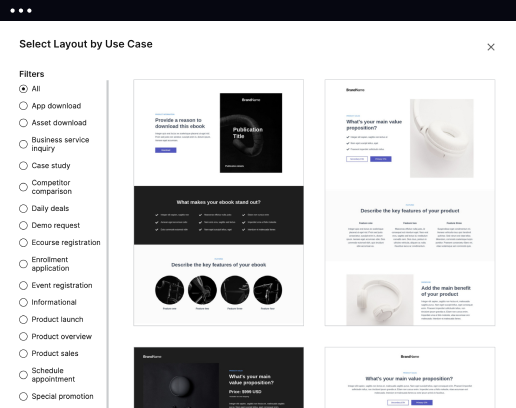
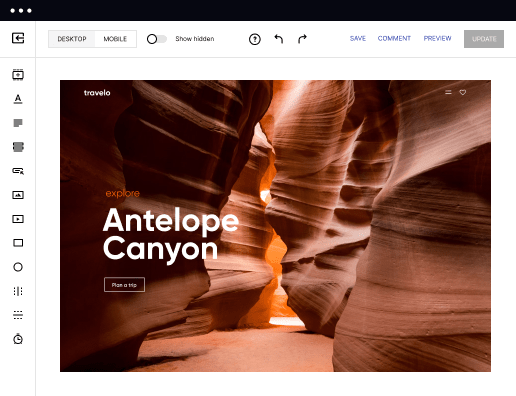
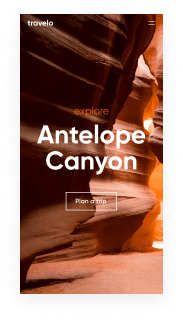
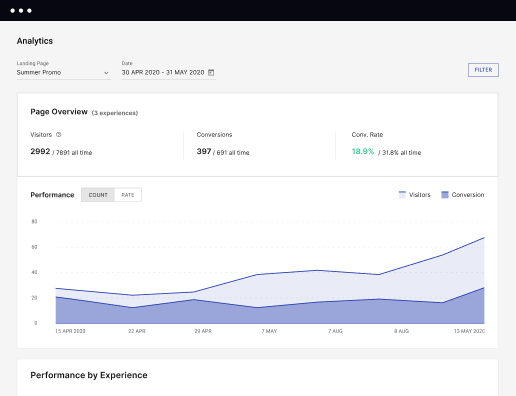
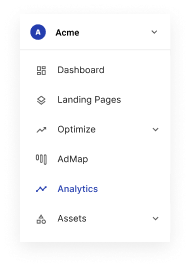
Easy to build without coding
With the intuitive drag-and-drop builder, anyone on your team can create high-converting pages without any knowledge of code or design. Make enhancements to your landing page with custom widgets using Javascript, HTML/CSS, or third-party scripts.
Multiple layouts for any industry and goal
Select from 500+ landing page layouts built to boost conversions across industry-specific scenarios. Customize them by adjusting fonts, adding images, and generating on-brand content with the AI assistant. Quickly scale with Instablocks® and Global Blocks that you can save, reuse, and update globally.
Loads fast and looks polished on any device
Every template is responsive, which means they present professionally on any device and load blazingly fast with our Thor Render Engine. You can also power them up with Google AMP technology to deliver an unparalleled mobile experience and drive higher conversions.
Robust analytics & experimentation
Get real-time updates and reporting across all your devices, showing the number of visitors, conversions, cost-per-visitor, and cost-per-lead. Launch AI-powered experiments, run A/B tests, and use heatmaps to analyze user behavior, then optimize your landing page to maximize conversions.
All the features you need to build lead-generating landing pages
Explore more featuresLearn how to build top-performing landing pages for any goal
FAQs
Leading the way in building high-performing landing pages





An intuitive guide to maximizing landing page performance with Instapage
Harnessing the full potential of landing pages can dramatically boost your marketing ROI. Instapage stands out as the premier platform for marketers, offering advanced tools that simplify the process of creating high-converting landing pages. This guide will take you through a step-by-step approach to optimizing your campaigns, ensuring that you not only drive traffic but also convert that traffic into leads and sales.
Understanding the essentials of an effective landing page
Before diving into the optimization process, it's crucial to grasp the characteristics that make a landing page effective. A successful landing page should be focused, designed with a specific goal in mind, and utilize elements that resonate with your audience.
- Clarity of purpose: Each page should have a singular goal, whether it's to capture leads or sell a product.
- Engaging design: Utilize high-quality visuals and a pleasing layout that keeps visitors focused on your CTA.
- Compelling copy: Write persuasive content that clearly outlines the benefits of your offering, urging visitors to take action.
Step 1: Select the right template
Instapage features over 100 customizable templates that cater to various industries and campaign goals. Choosing the right template is foundational to your landing page's success. Opt for a design that aligns with your brand and resonates with your target audience. Consider A/B testing multiple templates available in Instapage to measure which one performs best.
Step 2: Optimize your content
Content optimization is key to converting visitors effectively. Ensure your landing page has clear headlines and concise text, explaining how your product or service solves potential customers' problems.
- Headline clarity: Craft headlines that grab attention and convey the main benefit immediately.
- Bullet points for key features: Highlight essential features using bullet points to improve readability.
- Strong CTA: Design your call-to-action buttons to stand out and encourage clicks with actionable language.
Step 3: Leverage personalization
Personalizing the landing page experience can significantly enhance user engagement and conversion rates. Utilize Instapage's dynamic text replacement feature to tailor your messages based on the source of your traffic, ensuring relevancy to each audience segment.
- Dynamic text replacement: Automatically adjust headlines and content to reflect the user's search query.
- AdMap integration: Match specific ads with relevant landing pages to create a cohesive experience.
- Audience segmentation metrics: Use analytics to track user demographics and adapt your content accordingly.
By implementing these steps, you'll create landing pages that not only attract visitors but also convert them into valuable leads.
Are you ready to elevate your marketing campaigns with Instapage? Start building stunning landing pages today and unlock unparalleled growth for your business.
People also ask about Modern referral program page template
Understanding the Modern Referral Program Page Template
The evolution of referral programs
Referral programs have long been a cornerstone of marketing strategies. Historically, they relied heavily on word-of-mouth and personal recommendations, often facilitated through informal channels among friends and family. Bartering and direct incentives were common methods, where a referrer would receive a small benefit for bringing in new customers. This approach, while effective, was limited in its scope and lack of tracking capabilities.
With the advent of the digital landscape, referral marketing has evolved significantly. Businesses began utilizing email, social media, and online communities to drive referrals. Digital tools allowed for easier tracking and incentivization. As a result, referrals could be managed on a larger scale, with clearer metrics to gauge success. The significance of modern templates cannot be understated—they not only provide consistency but also enhance user experience by presenting information clearly.
Core components of a modern referral program page
A successful referral program hinges on several core components. First, there's the integration of coupon codes, which are essential for tracking referrals. Unique coupon codes allow businesses to easily identify which customer made the referral and reward them appropriately. Best practices in this area include designing easy-to-use coupon code fields that minimize user error during input.
Referral links are another crucial element. They simplify the sharing process, making it easy for users to invite friends or family with a single click. Memorable and succinct referral links can significantly increase the likelihood of sharing, so companies should invest in creating catchy links that are tailored to their branding. Lastly, offering bonus incentives, such as cash, discounts, and exclusive access, motivates users to participate actively. Understanding the psychology behind these bonuses can be instrumental in designing effective programs.
Coupon codes for tracking referrals
Efficient referral link generation
Compelling bonus incentives
Structuring your referral program page
The structure of a referral program page can greatly impact user engagement. One effective method is the incorporation of dynamic widgets, which actively capture visitor attention. Customizable widgets can present different referral program aspects—like current rewards and testimonials—allowing users to engage at their own pace. Examples of effective designs include interactive leaderboards, reward trackers, or even gamification elements that encourage users to refer more friends.
A compelling FAQ section is another vital component. This section should cover key questions that potential participants might ask, such as how the referral program functions and details about the rewards. Maintaining transparency about the process fosters trust and minimizes concerns, making users more likely to engage.
Designing for user experience
An optimal user experience is central to the success of a referral program. Attention should be paid to the visual layout and navigation of the page. Best practices in layout design often involve using a combination of sliders, grids, and lists to present information in a digestible manner. Regular user testing can yield insights into what resonates best with your audience, allowing you to refine your layout continually.
Furthermore, given the increasing use of mobile devices, ensuring mobile responsiveness is paramount. Creating seamless experiences across different devices, including smartphones and tablets, will cater to your user base effectively. This involves optimizing images and content for mobile display and ensuring that forms are easy to fill out on smaller screens.
Payment methods and incentives management
Offering diverse payment options enhances user convenience in referral programs. Popular options to consider integrating include PayPal, direct bank deposits, and gift card options. The variety in payment methods not only improves the user experience but can also lead to higher engagement levels and an increase in referrals, as participants appreciate having choices that suit their preferences.
Moreover, keeping track of incentive distributions is crucial for maintaining transparency and trust. Utilizing specialized tracking tools helps monitor reward payouts effectively. This ensures that users feel confident in the program, knowing that they will receive their incentives as promised, which in turn encourages more referrals.
Leveraging stats and analytics in your referral program
To evaluate the success of your referral program, monitoring key metrics is essential. Important metrics to watch include conversion rates, referral rates, and customer acquisition costs. Tracking these can give insights into the performance of your program, helping you make informed decisions about adjustments and improvements.
Data-driven iterations are fundamental to refining your referral strategy. By analyzing user behavior and conversion statistics, businesses can glean valuable insights about what works and what doesn’t. Looking at successful case studies of referral programs that implemented changes based on analytics can provide a roadmap for others aiming for improvement.
Tracking conversion rates
Monitoring referral rates
Analyzing customer acquisition costs
Personalizing the referral experience
Personalized referrals can greatly enhance user engagement. Crafting messages that resonate with users based on their previous interactions and preferences encourages participation. Businesses should aim to tailor both messages and rewards, making users feel valued. When participants see that their input is recognized and rewarded, they are more likely to refer others.
Incorporating gamification strategies can further boost engagement. By introducing elements like points systems, levels, or leaderboards, users can feel a sense of competition and achievement in participating in the referral program. Well-known brands successfully utilize gamification, and businesses can learn from their approaches to create compelling experiences that stand out.
Case studies: successful implementation of modern templates
Reviewing how industry leaders excel in referral marketing can provide valuable insights. Companies with highly effective referral programs often utilize well-structured templates and design features that engage users. These practices might include personalized onboarding processes, clear and attractive design layouts, and strategic use of social proof to encourage new users to join.
Conversely, understanding common pitfalls can help businesses sidestep challenges. Some common mistakes include unclear incentive structures and lack of transparency in the referral process. By planning carefully and taking cues from both successes and failures, companies can design referral programs that are both effective and user-friendly.
The future of referral programs
The landscape of referral programs is continuously evolving. Emerging technologies such as artificial intelligence and blockchain are beginning to shape new practices in referral marketing. These technologies can optimize referral processes, enhance tracking capabilities, and provide clearer insights into user behavior, creating opportunities for innovation.
Integrating social media into referral programs is also crucial for amplifying reach. Techniques like leveraging user-generated content and collaborating with influencers can exponentially increase visibility. As referral marketing continues to evolve, maintaining a strong presence across multiple channels will be key.
Final thoughts on crafting effective referral pages
In summary, modern referral program pages should encapsulate clear communication, user-friendly design, and robust incentive structures. Key takeaways from this exploration include the importance of personalization and tracking, the role of diverse payment methods, and the value of leveraging analytics for continual improvement. Businesses should remain open to innovation, utilizing every available resource to refine their referral strategies.
Encouraging creativity in designing referral templates will enhance user engagement and potentially drive significantly higher referral rates. As businesses adopt new technologies and strategies, they will find that adapting to the changing landscape of referral marketing can yield substantial benefits.
Ready to skyrocket conversions?
Supercharge your ad campaigns with high-performing landing pages
Get started



